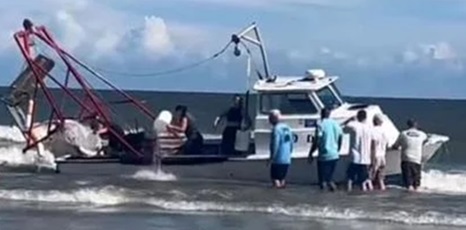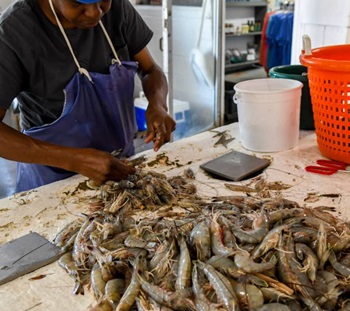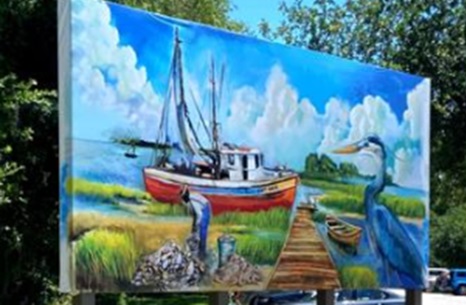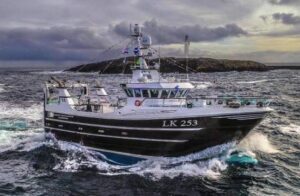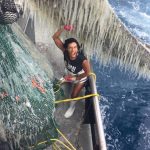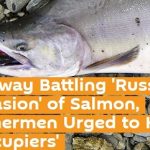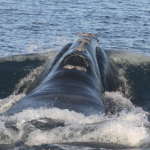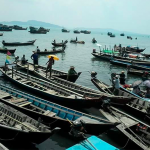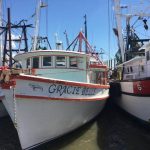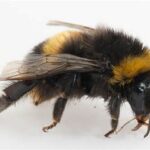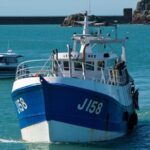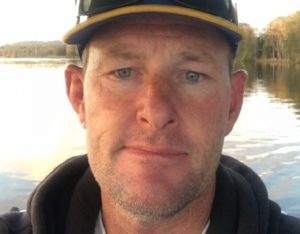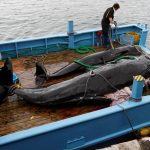Tag Archives: South Carolina
South Carolina shrimpers are in troubled waters. Here’s how the industry is seeking relief
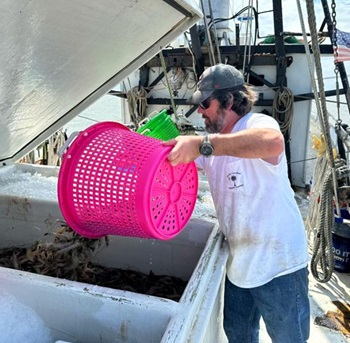 South Carolina shrimpers are in a fight for their industry’s future. Facing pressures from foreign countries shipping in cheap, frozen catches in abundance, domestic shrimpers have been unable to compete. Bryan Jones is a first-generation shrimper in McClellanville. Before his life became centered around nets and saltwater and fresh catch, he was a vice president of a wealth management firm in Florida. The work is exhausting and the days on the deck of his trawler, the Pamela Sue, are long, Jones said. There are risks involved with shrimping — financial, environmental, physical — but he saw an opportunity to create a livelihood for his family and couldn’t resist. He joins at a time when fishermen are struggling, and more are deciding to leave the trade altogether. “The average age of a shrimp boat captain, I believe, is 65,” Jones said. “What we need is an injection of youth in the industry to sustain it.” Photos, more, >>CLICK TO READ<< 11:21
South Carolina shrimpers are in a fight for their industry’s future. Facing pressures from foreign countries shipping in cheap, frozen catches in abundance, domestic shrimpers have been unable to compete. Bryan Jones is a first-generation shrimper in McClellanville. Before his life became centered around nets and saltwater and fresh catch, he was a vice president of a wealth management firm in Florida. The work is exhausting and the days on the deck of his trawler, the Pamela Sue, are long, Jones said. There are risks involved with shrimping — financial, environmental, physical — but he saw an opportunity to create a livelihood for his family and couldn’t resist. He joins at a time when fishermen are struggling, and more are deciding to leave the trade altogether. “The average age of a shrimp boat captain, I believe, is 65,” Jones said. “What we need is an injection of youth in the industry to sustain it.” Photos, more, >>CLICK TO READ<< 11:21
New bill to expand federal relief eligibility for fishing/shrimping industry
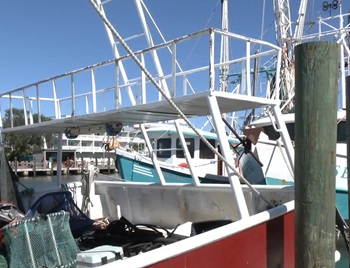 “The influx of imported shrimp has resulted in the decline of our fleets and massive job losses and our local businesses are devastated,” said Bryan Jones, the Vice President of the South Carolina Shrimper’s Association. Standing in front of the shrimp boats of Shem Creek, US Congresswoman Nancy Mace (R) introduced the Protect American Fisheries Act on Friday. “Foreign dumping of shrimp filled with contaminants that don’t meet US safety standards is undercutting honest, hardworking, American fisherman,” said Congresswoman Mace. The bipartisan bill proposes to amend the Magnuson-Stevens Fishery Conservation and Management Act to include “economic causes” as a reason for declaring a fishery resource disaster. Video, more, >>CLICK TO READ<< 06:58
“The influx of imported shrimp has resulted in the decline of our fleets and massive job losses and our local businesses are devastated,” said Bryan Jones, the Vice President of the South Carolina Shrimper’s Association. Standing in front of the shrimp boats of Shem Creek, US Congresswoman Nancy Mace (R) introduced the Protect American Fisheries Act on Friday. “Foreign dumping of shrimp filled with contaminants that don’t meet US safety standards is undercutting honest, hardworking, American fisherman,” said Congresswoman Mace. The bipartisan bill proposes to amend the Magnuson-Stevens Fishery Conservation and Management Act to include “economic causes” as a reason for declaring a fishery resource disaster. Video, more, >>CLICK TO READ<< 06:58
Beaufort’s cherished blue crab is ‘mean as hell.’ But crabbers love catching them
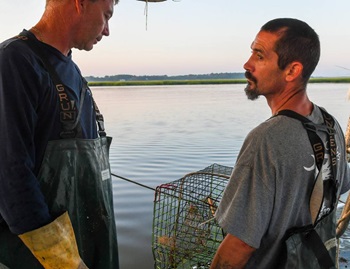 “They’re a delicacy,” says Everett, a St. Helena Island-based commercial crab fisherman, “but they’re mean as hell.” South Carolina’s coastlines are dominated by vast salt marshes with dense stands of smooth cordgrass and oyster reefs drenched twice daily by tides up to 8 feet. It is a perfect habitat for delicious blue crab, that hide in the grass feeding on oysters, clams and snails — anything they can get their vicious claws on. Sometimes, the cantankerous crustaceans burrow into the mud with only their beady “eye stalks” visible lying in wait for a passing meal. But if they’re not careful, the crabs, an important link in the food chain, will become a meal themselves for birds and fish — or caught by crabbers like Everett. more, >>CLICK TO READ<< 08:17
“They’re a delicacy,” says Everett, a St. Helena Island-based commercial crab fisherman, “but they’re mean as hell.” South Carolina’s coastlines are dominated by vast salt marshes with dense stands of smooth cordgrass and oyster reefs drenched twice daily by tides up to 8 feet. It is a perfect habitat for delicious blue crab, that hide in the grass feeding on oysters, clams and snails — anything they can get their vicious claws on. Sometimes, the cantankerous crustaceans burrow into the mud with only their beady “eye stalks” visible lying in wait for a passing meal. But if they’re not careful, the crabs, an important link in the food chain, will become a meal themselves for birds and fish — or caught by crabbers like Everett. more, >>CLICK TO READ<< 08:17
Hurricane Helene death toll climbs to 134 as search for missing in North Carolina continues
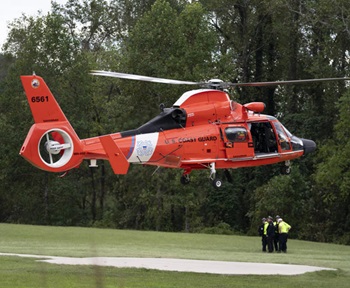 The death toll from Hurricane Helene continues to climb as rescue efforts persist across the Southeast. Hard-hit regions, including parts of western North Carolina, are receiving aid from various states as emergency crews work to reach isolated communities devastated by catastrophic flooding. The death toll attributed to Helene’s impacts has been steadily climbing, with at least 134 people now confirmed dead in six states – Florida, Georgia, South Carolina, North Carolina, Virginia and Tennessee. President Joe Biden announced he will travel to the region on Wednesday and is expected to visit Asheville, North Carolina, to get a firsthand look at the devastation. Biden is also expected to visit Florida and Georgia. Photos, Video, more, >>CLICK TO READ<< 12:47
The death toll from Hurricane Helene continues to climb as rescue efforts persist across the Southeast. Hard-hit regions, including parts of western North Carolina, are receiving aid from various states as emergency crews work to reach isolated communities devastated by catastrophic flooding. The death toll attributed to Helene’s impacts has been steadily climbing, with at least 134 people now confirmed dead in six states – Florida, Georgia, South Carolina, North Carolina, Virginia and Tennessee. President Joe Biden announced he will travel to the region on Wednesday and is expected to visit Asheville, North Carolina, to get a firsthand look at the devastation. Biden is also expected to visit Florida and Georgia. Photos, Video, more, >>CLICK TO READ<< 12:47
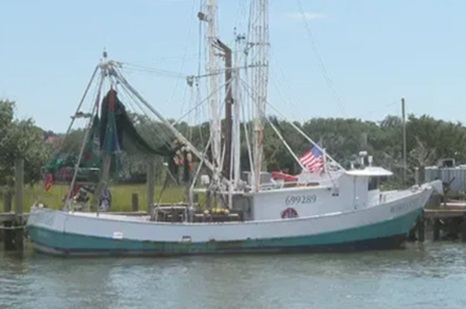
Infrastructure funding from 2018 winter freeze will finally get to shrimpers soon
2018 was a bad year for Lowcountry shrimping, a winter freeze wiped out most of the white shrimp in the Charleston harbor. Six years later, $1 million in grant money for shrimp fishery infrastructure will soon, finally be making its way to those who need it. But not everyone was able to qualify. “The funds are awarded by NOAA,” said Chris McDonough, the program coordinator for the Shrimp Disaster Relief Program. “When they’re awarded, typically we have to go through a grant approval process for us to get the money. It takes some time.” The program was put in place in 2018, but between the slow wheels of government and the pandemic, the first phase wasn’t paid out until last year. Video, photos, more, >>CLICK TO READ<< 09:28
Tom Poland – Wake-up call aboard the F/V Pamela Sue
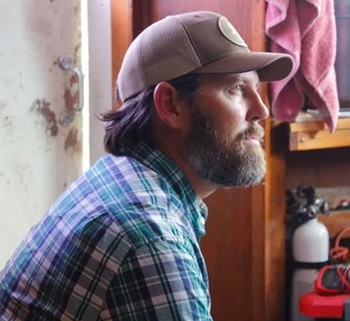 I got up at 4:30 a.m. to go to two Carolina bays in the Francis Marion National Forest. Hours later I left pitcher plants, blue irises and Halloween pennant dragonflies and headed to the McClellanville Diner for a platter of fresh-caught domestic shrimp. Consumers take note: it was not frozen, imported shrimp. After lunch I went into McClellanville, a lovely fishing village that’s home to South Carolina’s largest fleet of shrimp boats. As I made my way into McClellanville, I passed T.W. Graham & Co., another great local restaurant. Hand-painted on its windows were “Support #Freshlocal” and “God Bless Our Shrimpers.” Carolina Seafood sits on Jeremy Creek, a creek named after King Jeremy, a Seewee Indian chief whose tribe lived along the creek’s banks. There I met Capt. Bryan Jones. He catches shrimp, no easy task. Besides the hard and dangerous work, he must overcome many a challenge. Capt. Jones showed me around his boat, Pamela Sue. more, >>CLICK TO READ<< 08:31
I got up at 4:30 a.m. to go to two Carolina bays in the Francis Marion National Forest. Hours later I left pitcher plants, blue irises and Halloween pennant dragonflies and headed to the McClellanville Diner for a platter of fresh-caught domestic shrimp. Consumers take note: it was not frozen, imported shrimp. After lunch I went into McClellanville, a lovely fishing village that’s home to South Carolina’s largest fleet of shrimp boats. As I made my way into McClellanville, I passed T.W. Graham & Co., another great local restaurant. Hand-painted on its windows were “Support #Freshlocal” and “God Bless Our Shrimpers.” Carolina Seafood sits on Jeremy Creek, a creek named after King Jeremy, a Seewee Indian chief whose tribe lived along the creek’s banks. There I met Capt. Bryan Jones. He catches shrimp, no easy task. Besides the hard and dangerous work, he must overcome many a challenge. Capt. Jones showed me around his boat, Pamela Sue. more, >>CLICK TO READ<< 08:31
Feds say SC boat owner may face prison for catching too many fish, then concealing it
 A South Carolina fisherman has been indicted by a federal grand jury after authorities say he exceeded the number of fish he was legally allowed to catch, then attempted to conceal his actions. One count in the indictment charges Don Michael Rynn with submitting a trip report with a lower number of fish than he actually caught to the National Oceanic and Atmospheric Administration’s Southeast Fisheries Science Center. Another count charges him with lying to a federal agent, falsely telling the agent that various fish he caught were contaminated with oil and he disposed of them by putting them in a dumpster. The fish were snowy grouper and tilefish, according to the indictment. A third count charges him with falsifying records in a federal investigation. Maximum punishment in this case is a fine up to $250,000 and 20 years in prison. more, >>CLICK TO READ<< 14:38
A South Carolina fisherman has been indicted by a federal grand jury after authorities say he exceeded the number of fish he was legally allowed to catch, then attempted to conceal his actions. One count in the indictment charges Don Michael Rynn with submitting a trip report with a lower number of fish than he actually caught to the National Oceanic and Atmospheric Administration’s Southeast Fisheries Science Center. Another count charges him with lying to a federal agent, falsely telling the agent that various fish he caught were contaminated with oil and he disposed of them by putting them in a dumpster. The fish were snowy grouper and tilefish, according to the indictment. A third count charges him with falsifying records in a federal investigation. Maximum punishment in this case is a fine up to $250,000 and 20 years in prison. more, >>CLICK TO READ<< 14:38
He left a legacy in SC’s shrimping industry. Soon, he’ll be memorialized in Mount Pleasant.
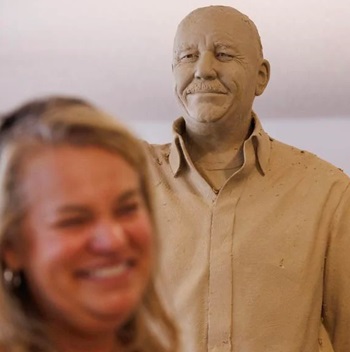 In an upstairs sculpture studio in Charleston’s sister city, Tressy Mellichamp saw her father again. Captain Edwin “Wayne” Magwood’s likeness stood tall in Susie Chisholm’s home studio. Chisholm has spent weeks skillfully carving Magwood’s features into the earth-toned material, piling the oil-based clay onto a 3D printed foam base and molding it into what now resembles the late fisherman. Videos, photos and stories from family members help guide Chishom’s impression of Magwood. He had a lot of character in his features, crinkles around his eyes, a playful smile and short, fat fingers that clearly belonged to a man who spent much of his life working with his hands — in Magwood’s case, on the water, trawling for shrimp. Video, photos, more, >>CLICK TO READ<< 09:22
In an upstairs sculpture studio in Charleston’s sister city, Tressy Mellichamp saw her father again. Captain Edwin “Wayne” Magwood’s likeness stood tall in Susie Chisholm’s home studio. Chisholm has spent weeks skillfully carving Magwood’s features into the earth-toned material, piling the oil-based clay onto a 3D printed foam base and molding it into what now resembles the late fisherman. Videos, photos and stories from family members help guide Chishom’s impression of Magwood. He had a lot of character in his features, crinkles around his eyes, a playful smile and short, fat fingers that clearly belonged to a man who spent much of his life working with his hands — in Magwood’s case, on the water, trawling for shrimp. Video, photos, more, >>CLICK TO READ<< 09:22
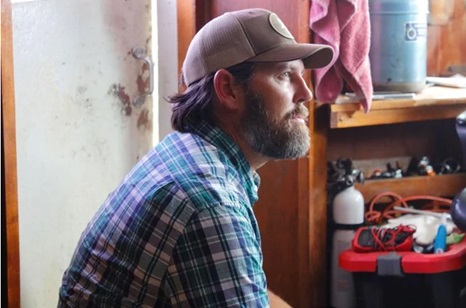
Wake Up Call Aboard The Pamela Sue
Carolina Seafood sits on Jeremy Creek, a creek named after King Jeremy, a Seewee Indian chief whose tribe lived along the creek’s banks. There I met Capt. Bryan Jones. He catches shrimp, no easy task. Besides the hard and dangerous work, he must overcome many a challenge. Capt. Jones showed me around his boat, Pamela Sue. Making our way through and past an assemblage of ropes, pulleys, nets, chains, and cables I filed a mental note. “Never bring a tripod onto a shrimp boat’s deck.” The chance of snagging something dangerous is great. Capt. Jones and I sat in the wheelhouse of his 1958 boat. As he discussed shrimping’s challenges, I looked around. I noticed bunk beds right away. Shrimpers sleep in their floating office, their home away from home. I saw too a small galley and a handsome wooden wheel caught my eye. And something else. An array of sophisticated electronics that navigate and portray bottom conditions and more. more, >>CLICK TO READ<< 10:33
Commentary: Bill would provide relief to SC’s hurting shrimp industry
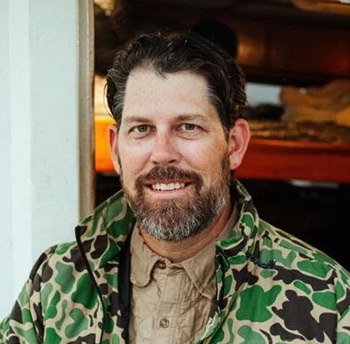 First as a shrimper but also as the vice president of the South Carolina Shrimpers Association and as a director of the U.S. Shrimpers Coalition, I write to voice strong support for the Save Our Shrimpers Act (H.7932) that recently was introduced in Congress by U.S. Rep. Troy Nehls, R-Texas. This critical legislation would prohibit U.S. funding for foreign aquaculture projects, specifically shrimp farming, financed through international monetary institutions such as the World Bank that are in turn sold back into the United States, hurting our citizens. The influx of foreign shrimp into our markets has created a severe oversupply, driving down prices and inflating cold storage costs — a double blow to our domestic shrimp industry, which includes both wild-caught and locally farmed shrimp. more, >>CLICK TO READ<< 07:10
First as a shrimper but also as the vice president of the South Carolina Shrimpers Association and as a director of the U.S. Shrimpers Coalition, I write to voice strong support for the Save Our Shrimpers Act (H.7932) that recently was introduced in Congress by U.S. Rep. Troy Nehls, R-Texas. This critical legislation would prohibit U.S. funding for foreign aquaculture projects, specifically shrimp farming, financed through international monetary institutions such as the World Bank that are in turn sold back into the United States, hurting our citizens. The influx of foreign shrimp into our markets has created a severe oversupply, driving down prices and inflating cold storage costs — a double blow to our domestic shrimp industry, which includes both wild-caught and locally farmed shrimp. more, >>CLICK TO READ<< 07:10
$3 million Shem Creek dock renovations aim to boost shrimping, fishing fleet
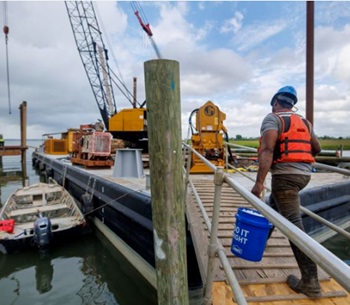 In a show of support for the longstanding shrimping industry, the Shem Creek docks are undergoing major renovations. The $3 million repair and rebuild of the dock, pier and processing building on Haddrell Street began June 11. Construction for the project was awarded to Cape Romain Contractors in April. Crews will remove and rebuild the existing boardwalk and pier to create a wider walking clearance for shrimpers and improve accessibility for workers and visitors. The shrimp docks are not the same as the boardwalk at Shem Creek Park and are tucked away from the restaurants and nightlife that surround the creek. Crews will also repair the shrimp processing section of the building where Tarvin Seafood operates. The back portion of the building has been condemned for years and is unsafe, said Cindy Tarvin, owner of the family-operated business. Photos, more, >>CLICK TO READ<< 09:13
In a show of support for the longstanding shrimping industry, the Shem Creek docks are undergoing major renovations. The $3 million repair and rebuild of the dock, pier and processing building on Haddrell Street began June 11. Construction for the project was awarded to Cape Romain Contractors in April. Crews will remove and rebuild the existing boardwalk and pier to create a wider walking clearance for shrimpers and improve accessibility for workers and visitors. The shrimp docks are not the same as the boardwalk at Shem Creek Park and are tucked away from the restaurants and nightlife that surround the creek. Crews will also repair the shrimp processing section of the building where Tarvin Seafood operates. The back portion of the building has been condemned for years and is unsafe, said Cindy Tarvin, owner of the family-operated business. Photos, more, >>CLICK TO READ<< 09:13
Man Of Fortune: Beloved Fisherman to Receive Memorial Statue at Shem Creek
 When dawn breaks on Shem Creek, there will soon be a glimmer on the water like never before. Atop the boardwalk that connects both sides of the creek will stand a bronze, life-size statue of a man who is now remembered as a Lowcountry legend. His name is Captain Wayne Magwood and soon his legacy will forever be enshrined as a testament to the role he played in preserving the area’s rich maritime history. Magwood’s life, career and family lineage have revolved around Shem Creek for the past century. In 1930, his father’s cousin, Captain William Magwood, was the first fisherman to bring ocean shrimp into Mount Pleasant and laid the foundation for the commercial industry to be built at Shem Creek. Photos, more, >>CLICK TO READ<< 08:55
When dawn breaks on Shem Creek, there will soon be a glimmer on the water like never before. Atop the boardwalk that connects both sides of the creek will stand a bronze, life-size statue of a man who is now remembered as a Lowcountry legend. His name is Captain Wayne Magwood and soon his legacy will forever be enshrined as a testament to the role he played in preserving the area’s rich maritime history. Magwood’s life, career and family lineage have revolved around Shem Creek for the past century. In 1930, his father’s cousin, Captain William Magwood, was the first fisherman to bring ocean shrimp into Mount Pleasant and laid the foundation for the commercial industry to be built at Shem Creek. Photos, more, >>CLICK TO READ<< 08:55
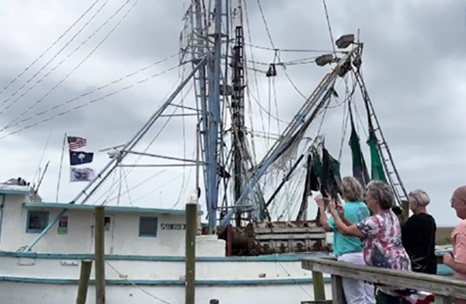
A call for the price of shrimp to rise as St. Helena Island’s boats head to sea
The future is uncertain for shrimpers in coastal South Carolina, but you wouldn’t know that from the bright, buoyant crowd that gathered Saturday at the Gay Fish Company. Attendees rang in the start of the 2024 season with cowbells and noisemakers, sending off a fleet of shrimp trawlers into the Harbour River as their nets waved like sails in the gentle morning breeze. Owned by a family of veterans spanning three generations, the Gay Fish Company on St. Helena Island held its inaugural “Blessing of the Fleet” Saturday morning. Typically involving a local pastor praying over captains for a safe and bountiful season, the practice has been a staple in fishing communities for centuries. But as fisheries up and down the coast grapple with industry shakeups from overseas, the ceremony takes on a new sort of significance. Photos, Video, more, >>CLICK TO READ<< 08:29
Mount Pleasant’s annual ‘Blessing of the Fleet’ honors local shrimp and fishing industry
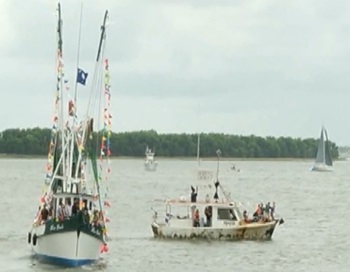 An annual event that pays tribute to the Lowcountry’s shrimping and fishing industry returns this weekend to Mount Pleasant Memorial Waterfront Park. Blessing of the Fleet and Seafood Festival serves as a kickoff to coastal shrimping season, which typically begins in early June. It also serves as a reminder to eat and buy locally caught shrimp to support Charleston’s seafood industry. It happens Sunday, April 28 from 11:00 a.m. until 5:00 p.m. Attendees can enjoy a boat parade, live music, craft show and plenty of free activities with the Ravenel Bridge and Charleston Harbor as a backdrop, organizers say. more, >>CLICK TO READ<< 06:34
An annual event that pays tribute to the Lowcountry’s shrimping and fishing industry returns this weekend to Mount Pleasant Memorial Waterfront Park. Blessing of the Fleet and Seafood Festival serves as a kickoff to coastal shrimping season, which typically begins in early June. It also serves as a reminder to eat and buy locally caught shrimp to support Charleston’s seafood industry. It happens Sunday, April 28 from 11:00 a.m. until 5:00 p.m. Attendees can enjoy a boat parade, live music, craft show and plenty of free activities with the Ravenel Bridge and Charleston Harbor as a backdrop, organizers say. more, >>CLICK TO READ<< 06:34
At start of season, shrimpers are ‘cautiously optimistic’ despite market concerns
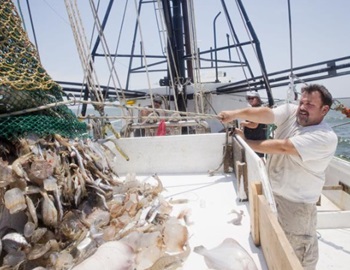 Fresh shrimp soon will be hitting the docks as the first stage of shrimp season gets underway the morning of April 19. This stage is limited to certain areas until the S.C. Department of Natural Resources can confirm the majority of female white shrimp have reproduced. “We want them to be able to spawn before harvest, because the current spawn will become our fall shrimp crop,” DNR spokesperson Erin Weeks said. This approach is essential to ensuring the industry remains sustainable, said Bryan Jones, South Carolina state co-director of the U.S. Shrimpers Coalition and a first-generation shrimper based in McClellanville. Photos, more, >>CLICK TO READ<< 12:28
Fresh shrimp soon will be hitting the docks as the first stage of shrimp season gets underway the morning of April 19. This stage is limited to certain areas until the S.C. Department of Natural Resources can confirm the majority of female white shrimp have reproduced. “We want them to be able to spawn before harvest, because the current spawn will become our fall shrimp crop,” DNR spokesperson Erin Weeks said. This approach is essential to ensuring the industry remains sustainable, said Bryan Jones, South Carolina state co-director of the U.S. Shrimpers Coalition and a first-generation shrimper based in McClellanville. Photos, more, >>CLICK TO READ<< 12:28
Gay Fish Company to hold Blessing of the Fleet ceremony, public welcome
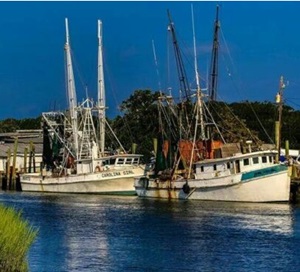 Since 1948, the Gay Fish Company on St. Helena Island has been fishing, shrimping, processing, and selling local seafood to thousands of customers from all over the country, and the world. After 76 years in business, you would be hard pressed to find many other families in the Lowcountry who are more synonymous with the shrimping and fishing industry. To do something special for the commercial fishermen that are docked there, and to raise awareness for the industry to the public, the family-owned seafood company is hosting its first ever Blessing of the Fleet Ceremony on April 27th, and the public is welcome to attend. more, >>click to read<< 06:22
Since 1948, the Gay Fish Company on St. Helena Island has been fishing, shrimping, processing, and selling local seafood to thousands of customers from all over the country, and the world. After 76 years in business, you would be hard pressed to find many other families in the Lowcountry who are more synonymous with the shrimping and fishing industry. To do something special for the commercial fishermen that are docked there, and to raise awareness for the industry to the public, the family-owned seafood company is hosting its first ever Blessing of the Fleet Ceremony on April 27th, and the public is welcome to attend. more, >>click to read<< 06:22
Mount Pleasant invests in improved safety, functionality of shrimp boat docks
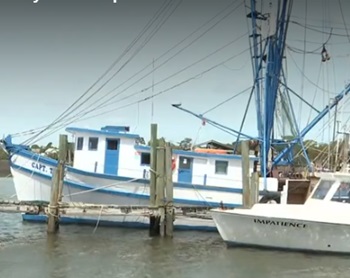 Much needed upgrades are coming to an important part of Mount Pleasant’s legacy. Town leaders are allocating money to renovate its shrimp boat docks in preparation for a busy shrimping season. “The more boats, the better the dock needs to be,” Rocky Magwood, President of SC Shrimpers Association said. The process of bringing shrimp from the deck to the table is a vision that’s coming to life as the Town of Mount Pleasant’s budget for shrimp boat docks will allocate funding for an updated look and safety upgrades. Magwood says that the docks are wearing out and it’s necessary for a refresh. Video, more, >>click to read<< 13:01
Much needed upgrades are coming to an important part of Mount Pleasant’s legacy. Town leaders are allocating money to renovate its shrimp boat docks in preparation for a busy shrimping season. “The more boats, the better the dock needs to be,” Rocky Magwood, President of SC Shrimpers Association said. The process of bringing shrimp from the deck to the table is a vision that’s coming to life as the Town of Mount Pleasant’s budget for shrimp boat docks will allocate funding for an updated look and safety upgrades. Magwood says that the docks are wearing out and it’s necessary for a refresh. Video, more, >>click to read<< 13:01
Shrimping: an endangered tradition
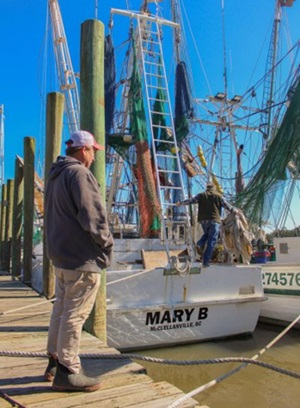 The salty ocean air, the smell of pluff mud, seafood restaurants line the streets, yet shrimp boats sit docked at the harbor. This is the scene pictured in the future by local shrimper and president of South Carolina’s Shrimpers Association, Rocky Magwood, as a result of imported shrimp. Shrimping has long been a tradition and staple of the local Charleston industry, with generations of shrimpers selling their product locally and beyond. A proud heritage and position for many shrimpers. However, as a result of increasingly high levels of imported shrimp, local shrimping jobs are at risk, according to Rocky Magwood. “The p rice of shrimp is terrible,” Magwood said. “Most shrimpers are broke right now.” photos, more, >>click to read<< 06:32
The salty ocean air, the smell of pluff mud, seafood restaurants line the streets, yet shrimp boats sit docked at the harbor. This is the scene pictured in the future by local shrimper and president of South Carolina’s Shrimpers Association, Rocky Magwood, as a result of imported shrimp. Shrimping has long been a tradition and staple of the local Charleston industry, with generations of shrimpers selling their product locally and beyond. A proud heritage and position for many shrimpers. However, as a result of increasingly high levels of imported shrimp, local shrimping jobs are at risk, according to Rocky Magwood. “The p rice of shrimp is terrible,” Magwood said. “Most shrimpers are broke right now.” photos, more, >>click to read<< 06:32
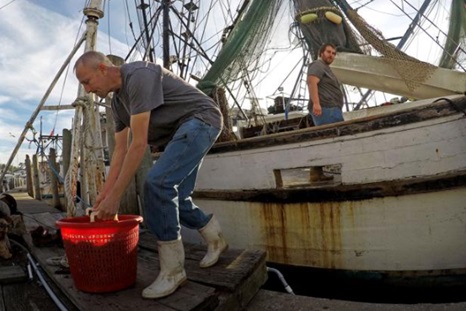
Last haul? As Georgetown eyes redevelopment, shrimpers brace for end of working waterfront
Timmy Jordan has spent most of his 49 years on the water. No wife. No kids. Just days and nights of dragging coastal waterway bottoms for shrimp, hoping for a good haul. But over the last few months, he has grappled with the stages of grief — denial, anger, bargaining and depression. He’s been preparing to moor his trawler alongside sailboats scattered in the Sampit River because he and this city’s other five shrimp boat owners were told the dock at the end of Cannon Street will close this month. The target date for the closure has been fluid since last year as the Tarbox family worked through selling Independent Seafood, the former wholesale market on the dock that originally opened in 1939. The shrimpers have tried to find open dock space from the North Carolina line toward Georgia but have been told no one has room. For them, an anchor is the only option. “This is my life ending,” Jordan said aboard his Miss Lue. “This is death for us that’s been in the business for so many years. We’re dying. It’s dying, and we’re dying with it.” 63 photos, more, >>click to read<< 11:55
Do You Know Your Lowcountry? The Mosquito Fleet
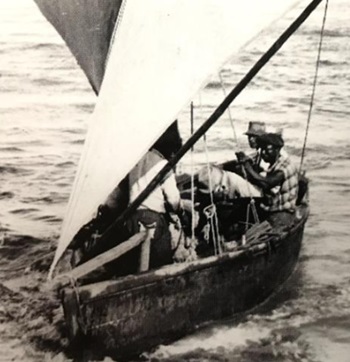 For more than two centuries before refrigeration, these Black fishermen braved the winds, waves and weather to supply Charlestonians daily with fresh fish and seafood, a mainstay of local diets. The fleet’s work was hard and dangerous, requiring perseverance in the face of all kinds of weather, as memorialized in America’s first native opera, “Porgy and Bess.” So critical was their role, Revolutionary War Gen. Charles Cotesworth Pinckney donated a parcel of his waterfront property at the east end of Market Street to serve as their wharf. Believing there was safety in numbers, the boats departed, fished and returned together. Though undocumented, folklore credits one of Pinckney’s daughters with giving the fleet its nickname, as she noted one morning that the boats looked like a swarm of mosquitos coming over the horizon. photos, more, >>click to read<< 08:12
For more than two centuries before refrigeration, these Black fishermen braved the winds, waves and weather to supply Charlestonians daily with fresh fish and seafood, a mainstay of local diets. The fleet’s work was hard and dangerous, requiring perseverance in the face of all kinds of weather, as memorialized in America’s first native opera, “Porgy and Bess.” So critical was their role, Revolutionary War Gen. Charles Cotesworth Pinckney donated a parcel of his waterfront property at the east end of Market Street to serve as their wharf. Believing there was safety in numbers, the boats departed, fished and returned together. Though undocumented, folklore credits one of Pinckney’s daughters with giving the fleet its nickname, as she noted one morning that the boats looked like a swarm of mosquitos coming over the horizon. photos, more, >>click to read<< 08:12
Catch of the Night
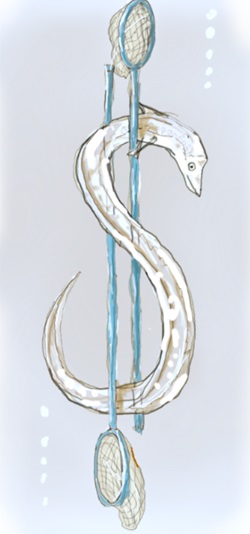 The American eel’s lifestyle is as elusive as it gets. No one has seen one mate in the Sargasso Sea, the eel’s birthplace. However, we know that after hatching, eels begin their journey to land by following the Antilles Current and Gulf Stream toward the mouths of North American rivers. Elvers (juvenile specimens also known as glass eels) then venture inland, mature, and later return to the ocean to mate, with the entire process ranging from a few months to a few years in duration. The unfortunate truth is that eel populations worldwide are rapidly declining. They have faced overfishing since the 1970s, resulting in poaching regulations in most of the world. Today, just two US states award eel fishing licenses: South Carolina and Maine. Because South Carolina only allows traps for fully grown eels, Maine has become the heart of the elver issue. more, >>click to read<< By Phil Avilov10:31
The American eel’s lifestyle is as elusive as it gets. No one has seen one mate in the Sargasso Sea, the eel’s birthplace. However, we know that after hatching, eels begin their journey to land by following the Antilles Current and Gulf Stream toward the mouths of North American rivers. Elvers (juvenile specimens also known as glass eels) then venture inland, mature, and later return to the ocean to mate, with the entire process ranging from a few months to a few years in duration. The unfortunate truth is that eel populations worldwide are rapidly declining. They have faced overfishing since the 1970s, resulting in poaching regulations in most of the world. Today, just two US states award eel fishing licenses: South Carolina and Maine. Because South Carolina only allows traps for fully grown eels, Maine has become the heart of the elver issue. more, >>click to read<< By Phil Avilov10:31
A unique partnership connects Lowcountry fishermen with people who don’t have enough to eat
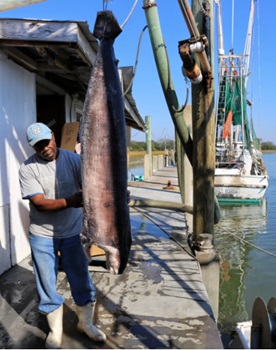 Daniel LaRoche watches as his crew, who’s just returned from nearly two weeks at sea, hoists dozens of giant swordfish from the belly of a boat. Some are real whoppers, weighing more than 200 lbs. LaRoche owns Cherry Point Seafood on Wadmalaw Island, just south of Charleston, selling fresh fish and shrimp from his dock. But making a living, he says, has never been harder. He wrestles daily with the rising costs of fuel, boat repairs and lures. LaRoche says he must sell even more shrimp to compete with imports as he struggles to keep up. Now, a new program promises help, by providing monthly pre-paid orders for 160 pounds of his shrimp and swordfish. So, who’s picking up the tab? The South Carolina Aquarium in Charleston. photos, more, >>click to read<< 09:12
Daniel LaRoche watches as his crew, who’s just returned from nearly two weeks at sea, hoists dozens of giant swordfish from the belly of a boat. Some are real whoppers, weighing more than 200 lbs. LaRoche owns Cherry Point Seafood on Wadmalaw Island, just south of Charleston, selling fresh fish and shrimp from his dock. But making a living, he says, has never been harder. He wrestles daily with the rising costs of fuel, boat repairs and lures. LaRoche says he must sell even more shrimp to compete with imports as he struggles to keep up. Now, a new program promises help, by providing monthly pre-paid orders for 160 pounds of his shrimp and swordfish. So, who’s picking up the tab? The South Carolina Aquarium in Charleston. photos, more, >>click to read<< 09:12
VIDEO RELEASE: Coast Guard rescues 2 after vessel sinks 34 miles offshore Charleston
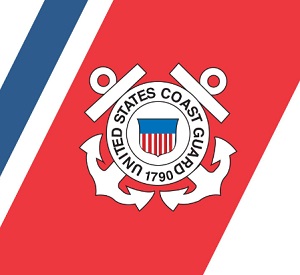 A Coast Guard Air Station Savannah helicopter crew rescued two men, Tuesday, after their 30-foot fishing vessel capsized 34 miles offshore of Charleston. Coast Guard Sector Charleston command center watchstanders received a mayday call at 10:30 p.m., via VHF-FM channel 16 from a crew member aboard the fishing vessel stating their vessel was sinking. Watchstanders directed the launch of a Coast Guard Station Charleston boat crew and an Air Station Savannah helicopter crew to assist. Utilizing direction finding technology to triangulate the last known position, watchstanders were able to identify the vessel’s approximate location. Once on scene at the vessel’s last known position, the helicopter crew immediately located a life raft with two people aboard. Video, more, >>click to read<< 19:30
A Coast Guard Air Station Savannah helicopter crew rescued two men, Tuesday, after their 30-foot fishing vessel capsized 34 miles offshore of Charleston. Coast Guard Sector Charleston command center watchstanders received a mayday call at 10:30 p.m., via VHF-FM channel 16 from a crew member aboard the fishing vessel stating their vessel was sinking. Watchstanders directed the launch of a Coast Guard Station Charleston boat crew and an Air Station Savannah helicopter crew to assist. Utilizing direction finding technology to triangulate the last known position, watchstanders were able to identify the vessel’s approximate location. Once on scene at the vessel’s last known position, the helicopter crew immediately located a life raft with two people aboard. Video, more, >>click to read<< 19:30
‘A perfect storm’: Beaufort, Bluffton urge Gov. McMaster to take action on shrimp dumping
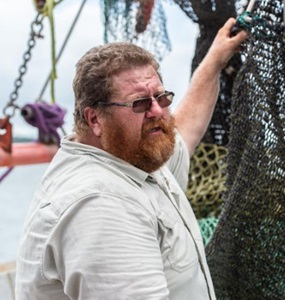 The city of Beaufort and the Town of Bluffton recently became the third and fourth coastal municipalities to call for the declaration of an economic disaster due to the dumping of imported shrimp into local markets. The actions speak to a statewide concern. Fishermen warn that limited resources and an inundated market have created a “perfect storm” that without intervention could tear apart South Carolina’s shrimping industry. On Dec. 12, Beaufort and Bluffton joined Mount Pleasant and McClellanville in urging Gov. Henry McMaster to declare an economic disaster due to the dumping of imported shrimp. Van Willis, Port Royal town manager, said officials there are planning to take a similar action in January. photos, more, >>click to read<< 06:29
The city of Beaufort and the Town of Bluffton recently became the third and fourth coastal municipalities to call for the declaration of an economic disaster due to the dumping of imported shrimp into local markets. The actions speak to a statewide concern. Fishermen warn that limited resources and an inundated market have created a “perfect storm” that without intervention could tear apart South Carolina’s shrimping industry. On Dec. 12, Beaufort and Bluffton joined Mount Pleasant and McClellanville in urging Gov. Henry McMaster to declare an economic disaster due to the dumping of imported shrimp. Van Willis, Port Royal town manager, said officials there are planning to take a similar action in January. photos, more, >>click to read<< 06:29
Beaufort leaders ask Gov. McMaster to declare economic disaster to help shrimping industry
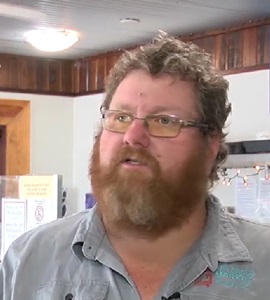 This all comes after local shrimper Craig Reaves sent this letter to city council explaining how shrimp dumping threatens his livelihood, and that of many others. In his letter to council, Reaves says that ‘all commercial fishing families have been decimated.’ He lists multiple reasons for said decimation but says that import dumping is the lead cause. For context, shrimp dumping is when farmed shrimp from other countries is sold to U.S. retailers and restaurants for below the market price that local shrimpers adhere to. Beaufort officials recognize the issue. “You can’t have locally owned operated seafood companies if the market price is going to be debased by this amount of flooded shrimp that’s coming in,” said Beaufort’s Acting Mayor Michael McFee. Video, more, >>click to read<< 08:40
This all comes after local shrimper Craig Reaves sent this letter to city council explaining how shrimp dumping threatens his livelihood, and that of many others. In his letter to council, Reaves says that ‘all commercial fishing families have been decimated.’ He lists multiple reasons for said decimation but says that import dumping is the lead cause. For context, shrimp dumping is when farmed shrimp from other countries is sold to U.S. retailers and restaurants for below the market price that local shrimpers adhere to. Beaufort officials recognize the issue. “You can’t have locally owned operated seafood companies if the market price is going to be debased by this amount of flooded shrimp that’s coming in,” said Beaufort’s Acting Mayor Michael McFee. Video, more, >>click to read<< 08:40
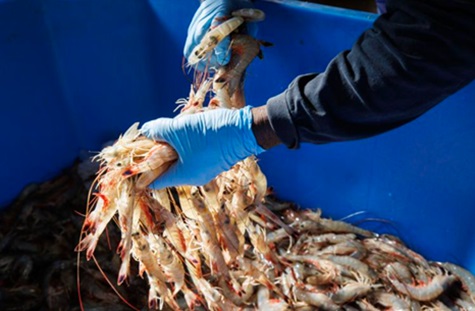
Editorial: South Carolina’s shrimpers are struggling; here’s 1 way to help
Those living in the Charleston area likely are well-familiar with the fact that our local shrimping industry has long been bruised by competition from imported shrimp, but the problem seems to have become more urgent than ever. Fortunately, there are steps we all can take to help out. As S.C. Shrimpers Association vice president Bryan Jones wrote in his recent letter to the editor, our state’s shrimping fleet has reached a critical juncture, threatening the livelihoods of thousands of families and a cherished way of life along our coast. That’s why our state’s association is joining with similar groups in other coastal states to press their case on both the state and federal levels, seeking an economic disaster declaration that would lead to short-term relief, such as low-interest loans and tax breaks. >>click to read<< 11:28
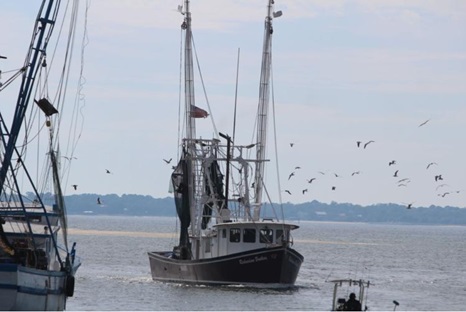
The Fleet fights back: Fishermen unite to curb shrimp dumping
Mount Pleasant’s Economic Development Committee met on Nov. 6 and voted in favor of the proposed economic disaster declaration from the South Carolina Shrimper’s Association and Southern Shrimp Alliance that asserts the Mount Pleasant shrimping fleet can’t sustain itself due to the harmful impacts of shrimp dumping, or the flooding of the market with imported, non-domestic shrimp. Mount Pleasant is the second municipality in South Carolina to declare a state of economic disaster for the domestic shrimping industry. Bryan Jones, vice president of the South Carolina Shrimper’s Association, said the declaration is more than symbolic — it’s one crucial part of a fight that is bringing fishermen from across the Southern United States together to defend their businesses, livelihoods and the shrimping industry as a whole. >>click to read<< 12:40






